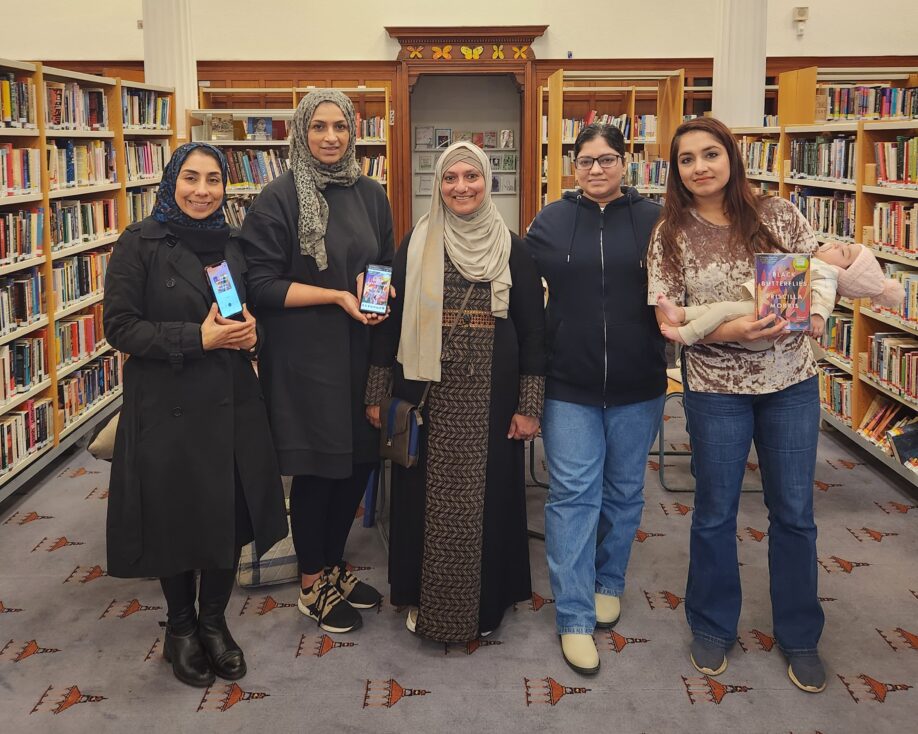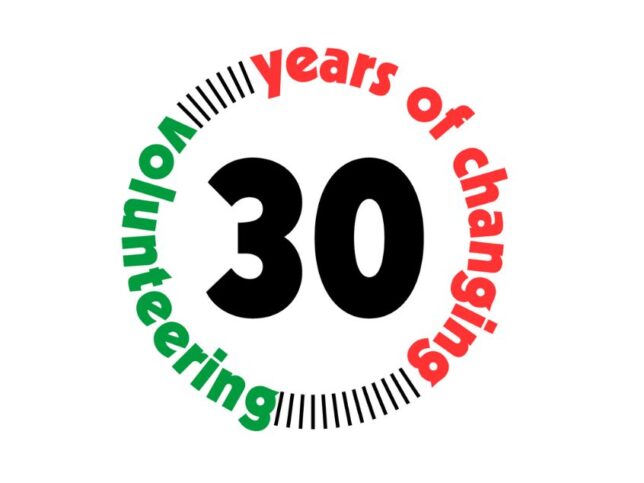
Glasgow Women’s Library (GWL) celebrated its 30th anniversary in September 2021. As we now enter our fourth decade we ‘look back to move forward’ through our 30 Years of Changing Minds Blog Series by staff and volunteers.
This blog is the first in a series of three blogs by Catherine who is doing a six month placement at GWL as part of her PhD. Over the past three months she has been exploring the Lesbians in Peer Support (LIPS) collection which is part of GWL’s organisational archive.
2000 was a pivotal year in Scotland’s queer history. In June, the Scottish Executive abolished Section 2A (known as Section 28 in England and Wales), and in November, UK parliament voted to bring the age of consent for gay and bisexual men on par with everyone else. In Glasgow, 2000 marks the founding of Lesbians in Peer Support (LIPS), GWL’s youth group for lesbians and bisexual women and girls between 14 and 25. LIPS eventually ran for six years, reaching and empowering hundreds of young queer people in Glasgow and rural parts of West Scotland. This blog post will tell you a little bit about the founding and early activities of LIPS, pulling from the LIPS collection housed in GWL’s archives.
LIPS emerged out of a difficult context for young queer women in Glasgow. A study into poverty and social exclusion among LGB people – the term ‘LGBT’ hadn’t become the norm in queer advocacy yet – in the Greater Glasgow area found that young LGB women and girls were particularly isolated and under-resourced. Another local youth group run by Lesbian Line had recently closed, and although the end of Section 28 was on the horizon, the ‘Keep the Clause’ campaign kept homophobia in the headlines. Early planning notes for the group tell us that “young lesbians have expressed a need for a project of which they feel a real sense of ownership and belonging which will provide information, support, creativity & a voice for their experiences.”
Enter – the Glasgow Women’s Library, then located at 109 Trongate. GWL volunteers secured three years of funding from Comic Relief to run the project, making LIPS the women’s library’s first funded project. This financial support meant that they could hire two staff members, Sue John and Shona Bruce to coordinate the group. The next challenge was finding young people to join LIPS. The first-time user forms in the LIPS archival collection paint a picture of a wide range of routes into the group. Some young people came across a flyer in the women’s library, or in one of the gay-friendly cafes and pubs where Sue and Shona had put up neon posters. The group was also advertised in Diva magazine. As LIPS went on, the first-time user forms document the rise of the internet as a tool for young people seeking out a queer community, but in 2000 physical flyers, magazines and word of mouth were the main way in.
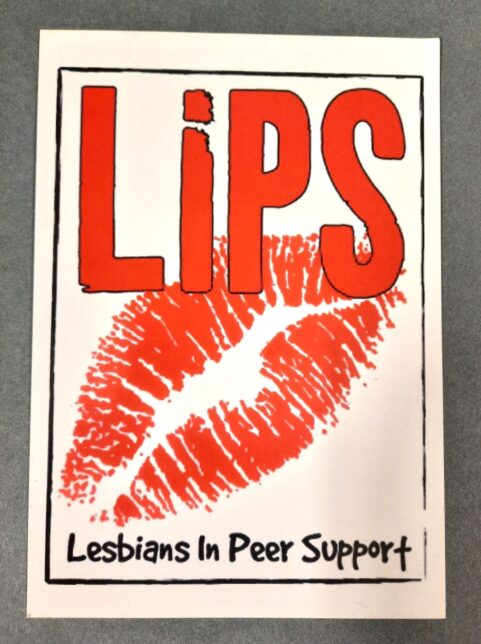
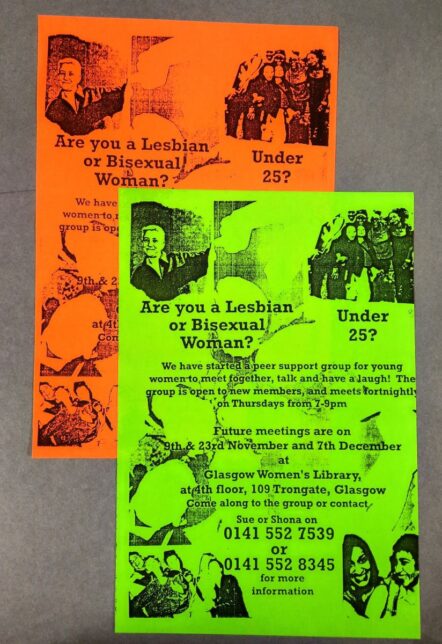
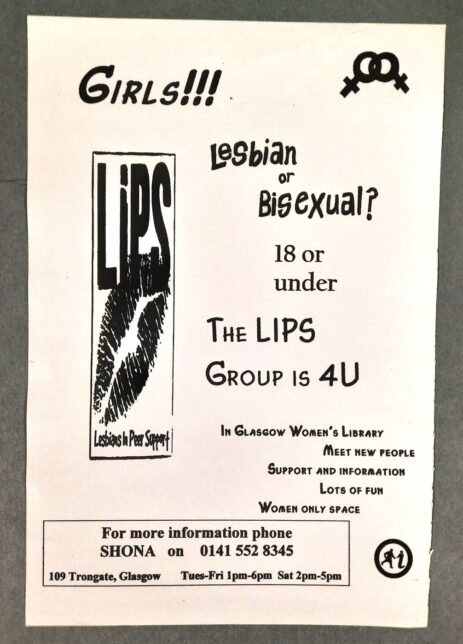
The diaries of the first few Thursday evening meetings record Sue and Shona’s nerves – would anyone come? Would young lesbians and bisexual women feel safe and supported by the group? In the end, more than a dozen young people came to the first meeting of what was then called the ‘Peer Support Project’. Surrounded by books and material from the Lesbian Archive, LIPS’ new members settled in, spoke about issues in their own lives, played games, watched films and forged friendships. In anonymous feedback forms, early members of the group discuss feeling a “sense of acceptance” at LIPS meetings. Spending time with other queer young women helped new members to express themselves, even when, as one LIPS member writes, “I have a lot to say, but find it hard to say it.” The “LIPS lassies” quickly made the group their own. It was one of these young people who coined its name, and the group soon settled on its bright red-lipped logo.
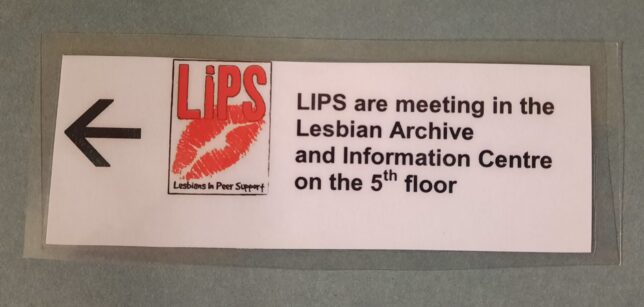
LIPS was launched in October 2000, at Glasgay!, Glasgow’s queer arts festival, with guest appearances from Scottish singer-songwriter Horse McDonald and Irish poet Cherry Smyth. At the launch event, a LIPS member described her experience as a member of Lesbian Line and the short-lived Glasgow Lesbian and Bisexual Youth Group (GLBYG), two precursors to LIPS: “Peer support projects such as GLBYG and LIPS exist to generate solidarity and a guiding hand for young lesbian and bisexual women as they tread into unknown territory.” She adds, “sometimes just knowing that you belong somewhere and that you’re not on your own makes for a healthier happier young woman, which in turn creates a more confident adult.”
In the next LIPS blog (find it here) I’ll share more from GWL’s records of LIPS activities over the next few years – from research and reports to self-portraits and self-defence.

This content is licensed under a Creative Commons Attribution 4.0 International License.

